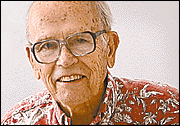


Hawaii’s World
Health care in final days
First of four articlesIdon't think the following statement is too grandi-ose: Good, compassionate final days' health care now is within reach of just about all of us IF WE WILL DEMAND IT. Furthermore, it can be tailored to our individual wishes.
The capital letters are important. Fine new rules are being put in place to assure such care -- and to help us demand it.
But to be sure of getting it we must know what is available.
In the hope of stimulating informed demands from even shy people I will devote this and my next three columns on June 3, 8 and 10 to explaining what soon should be possible -- and why I am so happy about it.
Since 1970 I have been writing that we handle death badly. We still do, but somewhat less badly. This year we are ready to cross some legal and regulatory bridges that pretty well require health-care providers to treat us as we want, except for doctor-assisted death.
All of us, young and old, should become aware of these options. Only then can we use them to best advantage to help us and our loved ones leave the world as much as possible in accord with individual wishes.
Some will want to fight to the very end to prolong life. Others will choose comfort care once recovery prospects dim. Many will opt to have life support withdrawn under specified circumstances.
The new tools are these:
Passage by the 1999 Legislature of a Uniform Health Care Decisions Act, based on a national model. If individuals fail to state in advance their wishes for final care, the bill makes it possible to select a surrogate, usually a relative, to speak for them when they are incapacitated. This is crucial when the option exists of withdrawing life support.
Passage by the 1999 Legislature of a Hospice Services Act to more fully insure hospice care and make it more available.
Adoption of strong new national pain-control standards by the influential Joint Commission on Accreditation of Healthcare Organizations. These all fit under an existing federal umbrella law that requires all organizations treating Medicare or Medicaid patients to give them information on admittance about living wills and advance directives.
Governor Cayetano's signature still is needed to turn the two legislative bills into law. His OK is anticipated. They carry out unanimous recommendations to him last year by his Blue Ribbon Panel on Living and Dying With Dignity, on which I served.
We split (11-7) only on recommending doctor-assisted death. There will be an effort to revive assisted death legislation next year, but the changes summarized above will affect far more people than will want assisted death. They should reduce the desire for it. That's one reason the Hawaii Catholic Conference strongly supports all the changes.
THE governor's panel had two other unanimous recommendations, which will be acted on without legislation -- more spiritual counseling and wider public education.
His Executive Office on Aging has qualified for a three-year $450,000 Robert Wood Johnson Foundation grant for public and professional education, policy development and research into how best to reach various minorities.
Local matches for the national grant mean Marilyn Seely, EOA director, will have the equivalent of $200,000 a year to devote to these goals.
Obstacles ahead include (1) providers still unskilled and hesitant with pain control, (2) too few and too late referrals to hospice care, and (3) our individual reluctance to fully discuss with family and/or friends our wishes for final care.
A.A. Smyser is the contributing editor
and former editor of the the Star-Bulletin
His column runs Tuesday and Thursday.